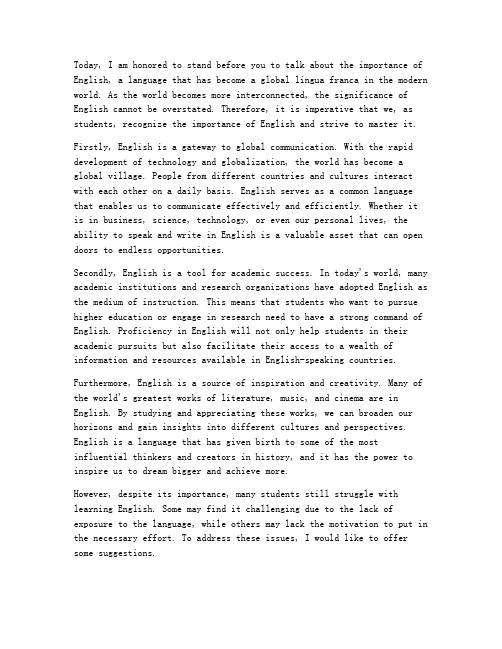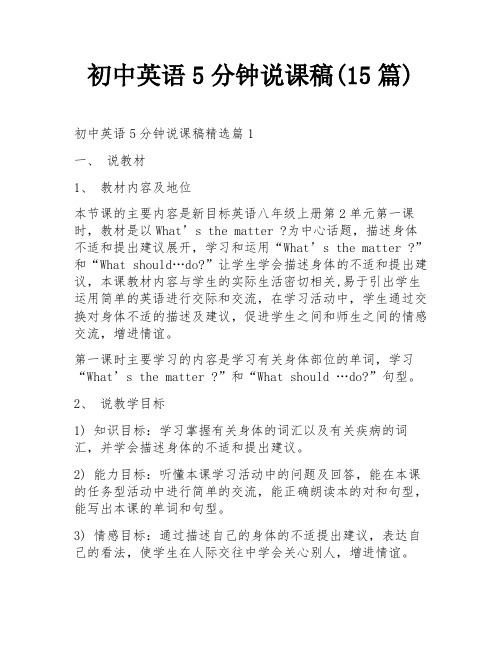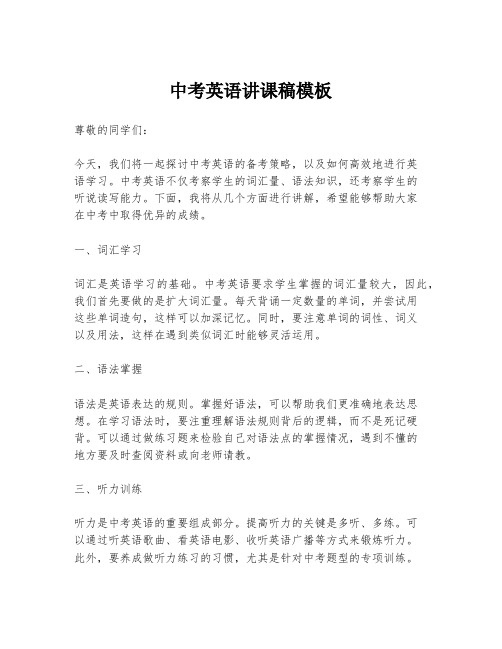初中英语命题讲课稿
初中英语听说讲课稿范文

初中英语听说讲课稿范文Hello everyone!Today, I am going to talk to you about the importance of listening and speaking skills in English. As you may know, listening and speaking are two of the four language skills, along with reading and writing. They are equally important in language learning because they help us communicate effectively with others.First, let's discuss the importance of listening skills. Listening is the first step in language acquisition. It is through listening that we are able to understand the sounds, words, and sentences in a language. By listening, we can also grasp the meaning and context of what is being said. Moreover, listening helps us improve our pronunciation and intonation. It helps us become more familiar with the rhythm and patterns of the language. Without good listening skills, it would be difficult to understand and respond accurately to spoken English.Now, let's move on to the importance of speaking skills. Speaking is the second step in language acquisition. It is through speaking that we are able to produce sounds, words, and sentences in a language. Speaking is crucial because it allows us to express ourselves and communicate our thoughts and ideas to others. By speaking, we can develop our vocabulary and grammar, as well as our fluency and confidence in using English. Speaking also helps us improve our pronunciation and intonation, as we can practice and imitate the sounds and patterns of the language.So, how can we improve our listening and speaking skills inEnglish? Here are some tips:1. Listen to English as much as possible. This can be done through various means like watching English movies, TV shows, and listening to English songs and podcasts. The more you expose yourself to the language, the better your listening skills will become.2. Practice speaking English regularly. Find opportunities to speak in English by talking to your classmates, friends, or even by joining English clubs or conversation groups. The more you practice, the more confident you will become in speaking English.3. Use resources specifically designed to improve listening and speaking skills. There are many textbooks, websites, and mobile applications that provide listening and speaking exercises and activities. Make use of these resources to enhance your skills.4. Pay attention to the pronunciation and intonation of native speakers. Try to imitate their speech patterns and practice your pronunciation regularly. This will help you sound more natural and improve your overall speaking skills.5. Take part in role-plays and discussions in English. This will give you the opportunity to practice speaking in different situations and develop your communication skills.In conclusion, listening and speaking skills are vital in language learning. They help us understand and communicate effectively in English. By practicing these skills regularly, we can improve ouroverall language proficiency. So, let's start listening and speaking in English as much as possible and become confident English speakers! Thank you for listening.。
初中英语命题-课件PPT

答案与题干搭配合乎语法
16. It’s twelve o’clock. It’s time ______. A. for lunch B. for supper C. to class D. to school (2003)
22. — Could you give me a hand, please? — Sure. What would you like me ?
8
(二)命题原则
1、根据《英语课程标准》确定考查内容 与标准,不拘泥于教材。 2、着重考查学生的综合语言运用能力。 3、考虑学生实际生活和身心发展水平。 4、注意选用真实、地道的语言素材,根 据语言实际使用情形命题。 5、注重试题的信度和效度,避免繁、偏、 旧的试题 。 6、根据试题的考查目的和考查重点,科 学合理地制定评分标准。
17. I am Cindy Brown. You can call ____ Cindy.
A. us B. him C. her D me
(2008)
18. — I can’t find my scarf. — There’s one here . It might be ______. A. hers B. his C. mine D. yours (2009) 24
(20082)6
20 — How was your holiday last weekend?
— Good. I to the mountains with my parents. A. go B. went C. am going D. will go (2007)
22. I really want to have a , I feel so tired after such a long walk.
英语学科命题演讲稿范文

Today, I am honored to stand before you to talk about the importance of English, a language that has become a global lingua franca in the modern world. As the world becomes more interconnected, the significance of English cannot be overstated. Therefore, it is imperative that we, as students, recognize the importance of English and strive to master it.Firstly, English is a gateway to global communication. With the rapid development of technology and globalization, the world has become a global village. People from different countries and cultures interact with each other on a daily basis. English serves as a common language that enables us to communicate effectively and efficiently. Whether it is in business, science, technology, or even our personal lives, the ability to speak and write in English is a valuable asset that can open doors to endless opportunities.Secondly, English is a tool for academic success. In today's world, many academic institutions and research organizations have adopted English as the medium of instruction. This means that students who want to pursue higher education or engage in research need to have a strong command of English. Proficiency in English will not only help students in their academic pursuits but also facilitate their access to a wealth of information and resources available in English-speaking countries.Furthermore, English is a source of inspiration and creativity. Many of the world's greatest works of literature, music, and cinema are in English. By studying and appreciating these works, we can broaden our horizons and gain insights into different cultures and perspectives. English is a language that has given birth to some of the mostinfluential thinkers and creators in history, and it has the power to inspire us to dream bigger and achieve more.However, despite its importance, many students still struggle with learning English. Some may find it challenging due to the lack of exposure to the language, while others may lack the motivation to put in the necessary effort. To address these issues, I would like to offer some suggestions.Firstly, we should create a conducive environment for learning English. This can be achieved by incorporating English into our daily lives, such as watching English movies, listening to English songs, and engaging in conversations with native speakers. Additionally, schools should provide more opportunities for students to practice English, such as organizing English clubs, language exchange programs, and competitions.Secondly, we should develop a positive attitude towards learning English. It is important to understand that learning a language is a gradual process, and it requires patience, perseverance, and determination. By setting realistic goals and celebrating our achievements, we can stay motivated and maintain our interest in learning English.Lastly, we should leverage technology to enhance our learning experience. With the advent of the internet and mobile devices, we now have accessto a wealth of online resources that can help us improve our English skills. From language learning apps to online courses, technology can be a powerful tool in our quest to master the English language.In conclusion, English is a language that plays a crucial role in our lives. By recognizing its importance and taking the necessary steps to improve our English proficiency, we can unlock the doors to a world of opportunities. Let us embrace the challenge of learning English and make it a part of our journey towards success.Thank you.。
初中英语5分钟说课稿(15篇)

初中英语5分钟说课稿(15篇)初中英语5分钟说课稿精选篇1一、说教材1、教材内容及地位本节课的主要内容是新目标英语八年级上册第2单元第一课时,教材是以What’s the matter ?为中心话题,描述身体不适和提出建议展开,学习和运用“What’s the matter ?”和“What should…do?”让学生学会描述身体的不适和提出建议,本课教材内容与学生的实际生活密切相关,易于引出学生运用简单的英语进行交际和交流,在学习活动中,学生通过交换对身体不适的描述及建议,促进学生之间和师生之间的情感交流,增进情谊。
第一课时主要学习的内容是学习有关身体部位的单词,学习“What’s the matter ?”和“What should …do?”句型。
2、说教学目标1) 知识目标:学习掌握有关身体的词汇以及有关疾病的词汇,并学会描述身体的不适和提出建议。
2) 能力目标:听懂本课学习活动中的问题及回答,能在本课的任务型活动中进行简单的交流,能正确朗读本的对和句型,能写出本课的单词和句型。
3) 情感目标:通过描述自己的身体的不适提出建议,表达自己的看法,使学生在人际交往中学会关心别人,增进情谊。
4) 文化意识目标:用恰当的方式表达自己的看法,增进人际交往中学会关心别人的能力,了解英美国家询问和表达身体不适的习惯,培养世界意识。
3、说教学重难点重点:本节课主要学习身体部位的单词和一些疾病的词汇,以及身体不适的表达及建议。
难点:身体不适的表达及建议二、说学情初二年级的学生对英语已经有了一定的基础,但本地区部分学生对学习英语的兴趣不是很浓,在学习中,他们更喜欢从游戏中或活动中学习,这样更能提高他们的学习兴趣,让他们更轻松地掌握英语知识。
三、说教法作为教学的引导着,我遵循新课程“学生是学习的主人,一切的教学活动设计在以学生为本”的教学理念,坚持“为学生的发展,必须培养学生的自主性、能动性、独立性和创造性”的教学原则。
初中英语考试说课稿范文

初中英语考试说课稿范文尊敬的评委老师,各位同仁,大家好。
今天,我将就即将进行的初中英语考试进行说课。
我将从教学目标、教学内容、教学方法、教学过程和教学反思五个方面进行阐述。
一、教学目标本次英语考试旨在全面检测学生对本学期所学知识的掌握程度,包括词汇、语法、阅读理解、听力理解以及写作能力。
具体目标如下:1. 确保学生能够熟练掌握本学期所学的英语词汇和短语。
2. 学生能够正确运用英语语法规则进行句子构造。
3. 提高学生的英语阅读理解能力,能够理解不同文体的文章。
4. 增强学生的英语听力理解能力,能够听懂不同场景下的对话或独白。
5. 培养学生的英语写作能力,能够就某一话题写出连贯、有逻辑的短文。
二、教学内容本次考试内容涵盖了以下几个方面:1. 词汇:包括本学期所学的单词和短语,以及它们的用法。
2. 语法:包括时态、语态、非谓语动词、从句等语法点。
3. 阅读理解:包括记叙文、说明文、议论文等多种文体的阅读材料。
4. 听力理解:包括日常对话、新闻报道、故事讲述等听力材料。
5. 写作:要求学生就给定话题写一篇不少于100字的短文。
三、教学方法1. 复习:通过课堂复习和课后作业,帮助学生巩固所学知识。
2. 练习:布置适量的练习题,包括选择题、填空题、改错题和写作练习。
3. 模拟测试:进行至少一次模拟考试,让学生熟悉考试流程和题型。
4. 分析反馈:对模拟考试的结果进行分析,指出学生普遍存在的问题,并给出改进建议。
四、教学过程1. 导入:通过提问或讨论的方式,激发学生对即将进行的考试的兴趣。
2. 复习:系统地回顾本学期所学的重点词汇、语法点和阅读材料。
3. 练习:指导学生完成各类练习题,强调答题技巧和时间管理。
4. 模拟考试:组织模拟考试,让学生在模拟的考试环境中检验自己的学习成果。
5. 反馈与总结:对模拟考试的结果进行分析,总结学生在考试中的表现,提出改进措施。
五、教学反思在考试结束后,我会对学生的考试表现进行深入分析,找出教学中的不足之处,如学生在某些题型上的普遍错误,或是教学方法上的不当。
初中英语模拟讲课稿范文模板

初中英语模拟讲课稿范文模板Good morning/afternoon, everyone!I am your English teacher, [Your Name], and I am very happy to have the opportunity to give a lesson today. In today's class, we will be focusing on [topic/theme]. Specifically, we will cover [subtopics]. By the end of this lesson, you will be able to [learning objectives].To start off, let's begin with a warm-up activity to get our brains thinking in English. I am going to show you a picture on the screen and I want you to take a couple of minutes to describe what you see. Remember to use as much English as possible and try to use the vocabulary and grammar that we have learned in previous lessons.[Show the picture on the screen and give students time to describe it.]Great job, everyone! Now let's move on to our first subtopic, which is [subtopic]. First, I want to give you a brief overview of this subtopic. Then, we will delve deeper into the main points.[Provide an overview of the subtopic by explaining its importance and relevance.]Now, let's discuss the main points of [subtopic]. I will present some key information, and then we will have a class discussion to reinforce our understanding.[Present key information using a combination of visuals, examples, and explanations.]Now, let's have a class discussion to reinforce our understanding. I will divide you into groups of [number] and provide each group with a question related to [subtopic]. Please discuss the question within your group and come up with a group answer. After [number] minutes, I will select one group to share their answer with the class. Remember to use English-only during the discussion.[Divide students into groups and provide them with a question related to the subtopic.][Give students time to discuss the question within their groups.] [Select one group to share their answer with the class.]Thank you, [group name], for sharing your answer. I think it was a great contribution to our class discussion. Now, let's move on to our next subtopic, which is [subtopic]. This subtopic is closely related to [previous subtopic], and it will further enhance our understanding of [topic/theme].[Provide an overview of the subtopic by explaining its relationship to the previous subtopic and its importance in building overall knowledge.]Now, let's dive deeper into the main points of [subtopic]. I will provide you with additional information, and then we will haveanother class discussion to solidify our understanding. [Present additional information using visuals, examples, and explanations.]Now it's time for our second class discussion. This time, I will form new groups and give each group a different question related to [subtopic]. Please discuss the question within your group and come up with a group answer. After [number] minutes, I will select one group to share their answer with the class.[Divide students into new groups and provide them with a question related to the subtopic.][Give students time to discuss the question within their groups.] [Select one group to share their answer with the class.]Thank you, [group name], for sharing your answer. I appreciate your unique perspective on the topic. Now, let's move on to our final subtopic, which is [subtopic]. This subtopic will tie all of our previous knowledge together and provide us with a comprehensive understanding of [topic/theme].[Provide an overview of the final subtopic by explaining its significance in connecting all the subtopics and reinforcing the overall understanding.]Next, I will present you with the final set of key information about [subtopic]. Pay close attention as this is the last piece of the puzzlebefore we move on to our final activity.[Present key information using visuals, examples, and explanations.]Now that we have covered all the subtopics, it's time for our final activity. I want you to think about how the subtopics we have discussed today are connected and how they relate to the overall topic/theme. I will give you a few minutes to write a short paragraph summarizing your understanding. After that, I will invite a few students to share their summaries with the class.[Give students time to write their summaries.][Invite students to share their summaries with the class.]Thank you, [student names], for sharing your summaries. I appreciate your thoughtful insights. It seems like everyone has developed a solid understanding of [topic/theme] and its various subtopics.To wrap up our lesson, I want to congratulate each and every one of you for actively participating and engaging in today's class. I'm very proud of your progress, and I encourage you to continue practicing your English skills outside of the classroom.Before we end, I will assign a small homework task that aligns with today's lesson. Please complete [homework task] and submit it by [due date]. Remember, practice makes perfect, so do your best!Thank you all for your hard work and attention today. I hope you found this lesson informative and enjoyable. Have a great day, and I'll see you next time![Optional: Additional time for questions and answers.]。
中考英语讲课稿模板

中考英语讲课稿模板尊敬的同学们:今天,我们将一起探讨中考英语的备考策略,以及如何高效地进行英语学习。
中考英语不仅考察学生的词汇量、语法知识,还考察学生的听说读写能力。
下面,我将从几个方面进行讲解,希望能够帮助大家在中考中取得优异的成绩。
一、词汇学习词汇是英语学习的基础。
中考英语要求学生掌握的词汇量较大,因此,我们首先要做的是扩大词汇量。
每天背诵一定数量的单词,并尝试用这些单词造句,这样可以加深记忆。
同时,要注意单词的词性、词义以及用法,这样在遇到类似词汇时能够灵活运用。
二、语法掌握语法是英语表达的规则。
掌握好语法,可以帮助我们更准确地表达思想。
在学习语法时,要注重理解语法规则背后的逻辑,而不是死记硬背。
可以通过做练习题来检验自己对语法点的掌握情况,遇到不懂的地方要及时查阅资料或向老师请教。
三、听力训练听力是中考英语的重要组成部分。
提高听力的关键是多听、多练。
可以通过听英语歌曲、看英语电影、收听英语广播等方式来锻炼听力。
此外,要养成做听力练习的习惯,尤其是针对中考题型的专项训练。
四、口语表达口语能力是英语实际应用的重要体现。
同学们可以通过参加英语角、和同学进行对话练习、模仿英语录音等方式来提高口语能力。
在练习时,要注意语音、语调的正确性,以及表达的流畅性。
五、阅读理解阅读理解是中考英语的另一个重点。
提高阅读理解能力,首先要广泛阅读,包括课本、课外读物、英文报刊等。
在阅读时,要学会快速浏览,抓住文章的主旨大意。
同时,要注意培养自己的推理判断能力,这对于解答阅读理解题非常有帮助。
六、写作技巧写作是表达思想的重要方式。
在中考英语写作中,要注意文章的结构、逻辑以及语言的准确性。
平时可以多写一些日记、书信、议论文等,以此来锻炼写作能力。
在写作时,要注意使用恰当的连接词,使文章条理清晰。
七、模拟考试模拟考试可以帮助我们熟悉考试流程,检验学习效果。
在模拟考试中,要严格按照中考的时间限制来完成试卷,这样可以提高应试能力。
《初中英语命题》课件

Ensuring that the questions are authentic and reflect real-life language usage.
Common Types and Categories of English Test Questions
Multiple Choice
Students choose the correct answer from a set of options.
Challenges in English Test Question Design and Solutions
1 Level of Difficulty
Designing questions that are challenging yet appropriate for the students' language proficiency level.
1
Time Management
Allocate time for each question and avoid spending too much time on difficult ones.
2
Reading Instructions Carefully
Understanding the question requirements before answering.
Learning Evaluation
They provide a way to evaluate the effectiveness of the English curriculum and teaching methods.
- 1、下载文档前请自行甄别文档内容的完整性,平台不提供额外的编辑、内容补充、找答案等附加服务。
- 2、"仅部分预览"的文档,不可在线预览部分如存在完整性等问题,可反馈申请退款(可完整预览的文档不适用该条件!)。
- 3、如文档侵犯您的权益,请联系客服反馈,我们会尽快为您处理(人工客服工作时间:9:00-18:30)。
《标准》指出:基础教育阶段英语课程的总 体目标是培养学生的综合语言运用能力。综 合语言运用能力的形成是建立在学生语言技 能、语言知识、情感态度、学习策略和文化 意识等素养整体发展的基础上;语言知识和 语言技能是综合语言运用的基础,文化意识 是得体运用语言的保证,情感态度是影响学 生学习和发展的重要因素,学习策略是提高 学习效率、发展自主学习能力的保证。2009 年温州市初中毕业生学业考试英语试卷的设 计体现了《标准》的要求,突出英语学科的 特点,符合新课程的发展性评价理念。
(二)命题原则
1、根据《英语课程标准》确定考查内容 与标准,不拘泥于教材。 2、着重考查学生的综合语言运用能力。 3、考虑学生实际生活和身心发展水平。 4、注意选用真实、地道的语言素材,根 据语言实际使用情形命题。 5、注重试题的信度和效度,避免繁、偏、 旧的试题 。 6、根据试题的考查目的和考查重点,科 学合理地制定评分标准。
三、所选文章贴近实际生活、贴近社会,突出英语学 科的教育价值。
试卷中6个篇章设计的话题贴近生活,引导考生 关注生活、关注社会、关注身边发生的事,巧妙地融 入了情感教育和价值观教育。如:完型填空取材于社 区业主会议的一篇发言稿,关于邻里之间或社区生活 中养狗和高空抛物带来的问题和危害,要求人们摒弃 不良的生活习惯,树立良好的社会公德,为社区美好 环境、安全和谐尽职尽责。阅读A篇是一篇电影介绍, 内容是关于两个孪生姐妹为让分开多年的父母重新结 合,使家人重新团聚而努力的故事;B篇讲述了一个 “奉献比索取更快乐”的哲理故事,给学生许多启迪, 具有积极的教育意义等等。词汇运用话题关注社会热 点甲型H1N1流感,倡导良好的生活和卫生习惯,引 导考生关注健康,关爱生命。
-Yes, it ______ very sweet. It is really a nice song. A. tastes B. sounds C. looks D. smells 正确答案为sounds.此题提供的语境真实,信息完整,既考 查了系动词的含义,又考查真实语境中运用英语的能力。
二、关注语言综合运用能力的考查,适合不同水平的考生, 体现层次性。
高树超
第一部分:新课程英语中考命题特点 第二部分:考试题分析 第三部分:试题命题要求
一、新课程英语中考命题特点
英语命题科学、合理,能够体现新课 程的评价理念,命题技术提高。
(一)初中学业考试命题依据
• 上位:课程ห้องสมุดไป่ตู้准 • 课程标准是国家教育质量在特定教育阶段
应达到的具体指标,具有法定的性质。 • 课程标准是国家管理和评价课程的基础,
4、试题题型简约化。
听力、单项填空、完形填空、阅读理解、 单词拼写、书面表达。
有利于减轻学生应试负担。 有利于提高学生语言技能。
二、中考试题分析
2009年中考英语试卷解读与分析
一、知识覆盖面广,话题涉及范围大,重视语境,体现语言的 交际性。
全卷考查了《标准》中五级要求的19个语法项目中的18个, 涉及《标准》要求的24个话题中的22个学生普遍熟悉的话题, 听力部分分别取材于学生生活中非常熟悉的11个情景,谈及天 气、旅游、职业、购物等15个话题,单项选择与完型填空重视 语境,题干设计严谨,把语言知识的考查巧妙地融于真实的语 境中,既考查了语言形式,又考查了语言意义,做到了语言准 确性和得体性的统一,体现了语言的交际性。 如第25小题:-Do you like You and Me?
• 2、主要功能转变。原来中考主要目的是为高中 招生服务;学业考试主要是为初中生学业评价服 务。从侧重选拔与甄别转向学业成就与潜能评定。
• 3、命题依据不同。原来中考主要教学大纲和教 材命题,学业考试将依据课程标准命题,绝不能 偏向任何一个版本的教材。
• 4、试题风格和题型将逐步发生改变。学业考试 将逐步向新课程的理念靠拢。
下位:教材
教材是制定考试标准的重要参考,也是 命题的重要参考。
教材是课程标准最主要的载体 ,是学生 学习的文本。
通过教材,更加准确地把握课程标准各 项要求。
通过教材,对考试条目的考试层次进行 准确定位。
通过教材,为的命题提供基本参照,特 别是难度、题型等。
学业考试与原来中考不同点:
• 1、考试性质不同。原来中考为选拨性考试,学 业考试是具有水平性质的终结性考试。
(三)试题具体特征
1、试题的选材体裁多样、题材丰富,具有较 好的思想性和教育性。这些特点在阅读理解、 完形填空和书面表达等试题上体现得更为突 出。 2、试题的技术质量普遍提高,尤其是单项选 择题,大多注重了语境化设计,基本上改变 了过去在脱离语境的情况下考查对知识点机
械记忆的倾向。
3、试题配置基本合理,考查内容全面,试 题的效度较高。除了考查语言知识以外, 强调对语言技能的考查,尝试对文化意识 和跨文化交际能力的考查。
是教材编写、教学、评估和考试命题的依 据。 • 课程标准是制定《学业考试说明》的基本 依据
以
《
课
程
标
综合语言
准
运用能力
》
为
依
据
语言技能
听说读写
• 中位:考试说明
• 考试说明是一种考试规范,是按照考试性质 和要求,对课程标准的细化和解释。
• 省教育厅文件规定:《考试说明》是全省各 地学业考试命题的依据,各市不得自行编写 《考试说明》。
试卷分别考查学生的听、说、读、写能力,跨文化交 际能力,重视基础,强调理解和运用。试卷中分别设计考 查对知识的记忆、识别、领会、理解、转换、运用、分析 和重组、运用语言做事的多维度能力层次,由易到难,有 一定的层次和区分度。如:完型填空中分别有根据字、词、 句和上、下文联系等多层面上理解并选择正确答案的试题 设置;阅读理解设题从细节、归纳、推断、猜词、主旨等 多维度考查考生的阅读能力;书面表达提供了图表、中英 文等不同形式的提示,表达的内容有一定的开放性,使不 同水平的考生都能获得相应的分数。
四、重视考查考生的学习策略,对初中英语教学发挥 积极的导向作用。
学习策略是提高语言学习效率、发展自主学习能 力的保证。因此在考查语言知识与技能的同时,整份 试卷的各个题型有意识渗透了对学生学习策略的考查, 如:听力题中的第一节借助图片表达听到的信息;第 三节中听录音记录关键信息选择正确答案;单项选择、 完型填空和阅读理解三大题中80%以上的试题需要考 生在理解上下文的基础上,通过推理、分析、归纳才 能选择正确答案;书面表达中要求考生根据图表信息, 进行分析和处理并用英语作书面表达;卷尾提供的小 词典还引导学生利用可利用的资源帮助答题,所有这 些设计对初中英语教学有着积极的导向作用。
